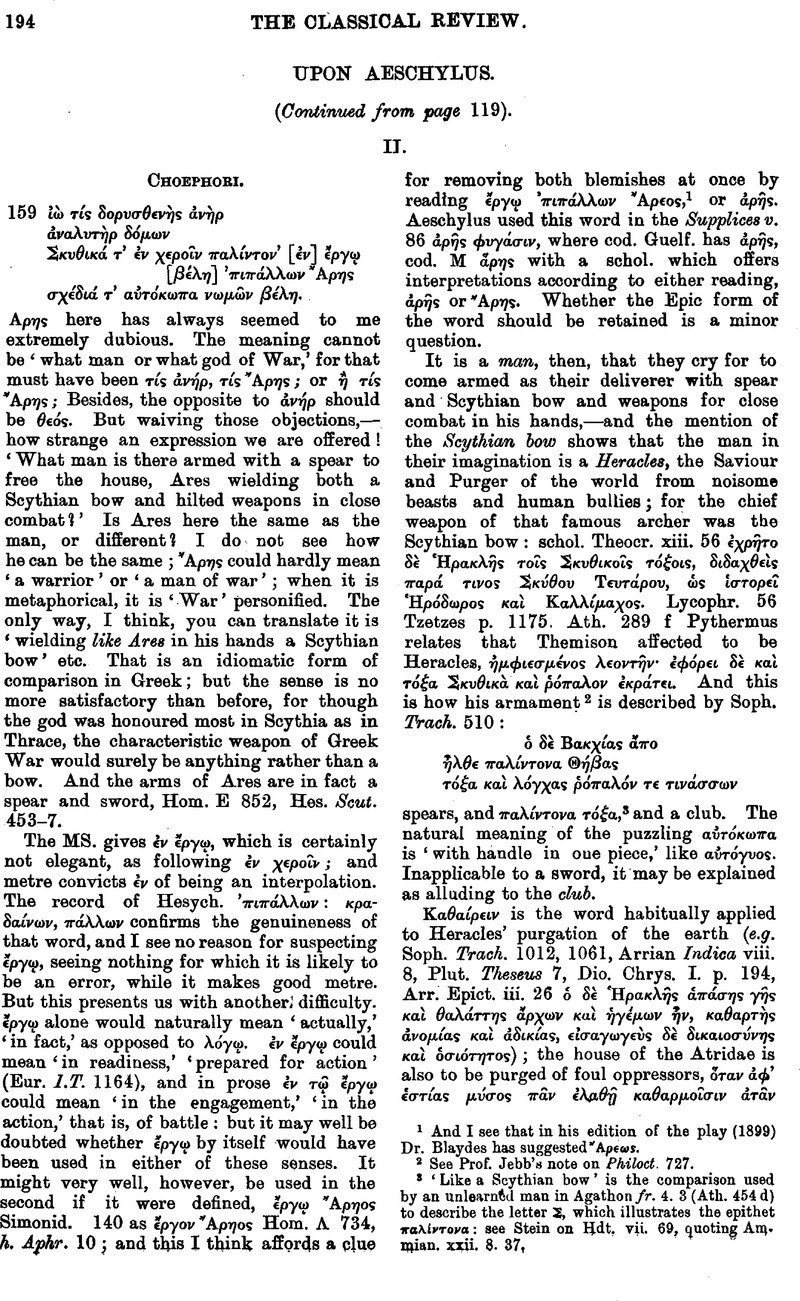Article contents
Abstract

- Type
- Original Contributions
- Information
- Copyright
- Copyright © The Classical Association 1900
References
page 194 note 1 And I see that in his edition of the play (1899) Dr. Blaydes has suggested Aρεως.
page 194 note 2 See Prof. Jebb's note on Philoct. 721.
page 194 note 3 ‘Like a Scythian bow’ is the comparison used by an unlearned man in Agathon fr. 4. 3 (Ath. 454 d) to describe the letter Σ, which illustrates the epithet ![]() : see Stein on Hdt. vii. 69, quoting Am. mian. xiii. 8. 37,
: see Stein on Hdt. vii. 69, quoting Am. mian. xiii. 8. 37,
page 195 note 1 Thus when Heracles instituted the Olympian games and won the pancration and wrestling, Ares was beaten in boxing by Apollo, Pausan. v. 7. 10,
page 196 note 1 I assumed that the scholium had always been overlooked, because it appeared from Wecklein's Appendix of conjectures that no use had yet been made of it. But Dr. Postgate has since pointed out to me that it was remarked by Conington as the phrase ‘by which Hesychius explains ’ and this fact Paley says ‘it is important to observe,’ adding that the Schol. probably found ![]() . Yet to Conington it ‘seems clear that
. Yet to Conington it ‘seems clear that ![]() formed part of the original text’, and Paley reads
formed part of the original text’, and Paley reads ![]()
page 197 note 1 989 ![]() what think you she would do
what think you she would do ![]() ;
;
page 197 note 2 See Eum. 628–640, and compare Ag. 1625 ![]() That is addressed to Aegisthus, and the phrase
That is addressed to Aegisthus, and the phrase ![]() is so framed that it might include Aegisthus here ; but that is by the way.
is so framed that it might include Aegisthus here ; but that is by the way.
page 197 note 3 Mueller, K. O.History of Greek Literature I. p. 414 sqq.Google Scholar
page 197 note 4 These optatives will leave no doubt that ![]() Eur. Bacch. 422 is an interpolation.
Eur. Bacch. 422 is an interpolation.
page 197 note 5 Compare Hermann's reading in 882 ![]() .
.
page 198 note 1 But the schol. Is written on ![]() .
.
page 199 note 1 The exact restoration is not clear, but unimportant for the purpose. ‘and tidings of her capture,—for so woman's manlike spirit is sanguine expect,’ ita enim sperare valet. The MS. Gives ![]() with o written above ω, meaning
with o written above ω, meaning ![]() , an obvious conjecture which naturally has not contented scholars. The correction I find from Wecklein had been proposed before by an anonymous critic in 1834, but I have never seen it even mentioned.
, an obvious conjecture which naturally has not contented scholars. The correction I find from Wecklein had been proposed before by an anonymous critic in 1834, but I have never seen it even mentioned.
- 1
- Cited by


